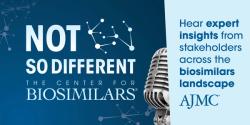© 2026 MJH Life Sciences™ and The Center for Biosimilars - Biosimilars, Health Economics & Insights. All rights reserved.
Wayne Winegarden, PhD Discusses the Potential Savings of Biosimilars
Wayne Winegarden, PhD discusses the potential savings inherent in biosimilars at the World Biosimilar Congress 2020 at the Festival of Biologics USA in San Diego, California.
Wayne Winegarden, PhD, is a senior fellow in business and economics as well as the Ddrector for the Standard for Medical Economics and Innovation at the Pacific Research Institute.
Transcript:
What does your research say about biologics and potential savings?
A lot of my recent research has been looking at biosimilars and specifically trying to quantify the amount of savings that are available, because we haven't had the market develop here the way you have seen biosimilars develop in Europe, nor the same way that you've seen generics developed to become 90% of market here, and one possibility is that the savings that we think areavailable aren't actually available. So, we went about looking at the actual price data, the actual volume data. We wanted to see what are the savings based on the current kind of pricing and volumes. And in fact, if you could get a substantial market share for biosimilars, there's a tremendous amount of savings, just in the 9 drug classes where there's either an actual competitor or a competitor that is authorized to compete against originator. We're talking somewhere between $2.4 and $7 billion in potential savings compared with a world without biosimilars. And that's an annual basis. To put that in perspective, between 2017 and 2018, the total spending on biologic drugs increased by $10 billion. So, if we could get to a 75% market share for biosimilars, which is less than the share for generic medicines, we could actually cut [spending on biologics] by 70%.



